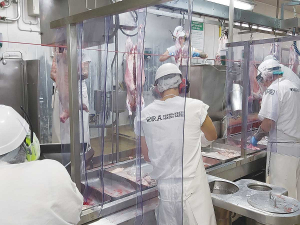MIA launches 2026 Red Meat Sector Dragon’s Den for innovative ideas
The Meat Industry Association (MIA) is once again looking for game-changing ideas for New Zealand's red meat processing and exporting sector.
 The meat sector believes the Climate Change Commission's assumption that NZ can reduce livestock numbers by 15%, while still maintaining current production volumes, is overly optimistic.
The meat sector believes the Climate Change Commission's assumption that NZ can reduce livestock numbers by 15%, while still maintaining current production volumes, is overly optimistic.
New Zealand's meat processing industry says, while it supports moves away from coal, it has some major concerns about cuts to livestock numbers as proposed in the recent Climate Change Commission’s draft report.
The industry says it is generally supportive of the focus on reducing the use of fossil fuels. However, as the country’s largest manufacturing sector, it is worried about the impacts of the report’s stated 15% reduction in sheep, cattle and dairy numbers.
Meat Industry Association chief executive Sirma Karapeeva says the country’s red meat processors and exporters are committed to reducing and eventually eliminating the use of coal, although achieving the commission’s 2037 target will be difficult.
“We do need a fair and just transition away from coal to ensure jobs and livelihoods are not put at risk. However, our chief concern is that any drop in livestock numbers may jeopardise the viability of some processing plants and jobs in rural communities,” Karapeeva explains.
“Meat processors rely on throughput of livestock to create efficiencies of scale and be profitable.
“The commission estimates that without major on-farm practice change and new technologies, a 15% reduction in livestock numbers will be required to achieve the targets by 2030.
“This would have a serious impact on the ability of many processors to keep operating.”
She adds that the assumption by the commission that we can reduce livestock numbers by 15%, while still maintaining current production volumes, seems optimistic.
“We need to understand why the commission made this assumption to better assess the likely effects for the industry.”
However, Karapeeva says the meat sector agrees with the commission – and sheep and beef farmers – that the widespread planting of exotic pine trees is not a long-term viable solution to addressing climate change.
“We can’t plant our way out of climate change. Wholesale planting of pine trees on sheep and beef farmland is not the answer and it will have significant implications for jobs in regional New Zealand,” she adds.
Currently, NZ’s red meat processing sector generates more than $10 billion in export revenue every year and is also a significant regional employer in New Zealand.
Karapeeva says any changes to this would have a major impact on people’s livelihoods – especially in regional parts of the country.
“For instance, in the Otago/Southland region, the sector employs 7,700 full-time people with more than 10,000 full-time jobs underpinned by the industry. It also contributes 11.5% of household income in the region,” she explains.
“In Taranaki/Manawatu and Whanganui, the sector supports almost 10% of full-time employment in the region with 5,200 directly and it underpins more than 8,300 full-time equivalent jobs.
The sale of Fonterra’s global consumer and related businesses is expected to be completed within two months.
Fonterra is boosting its butter production capacity to meet growing demand.
For the most part, dairy farmers in the Waikato, Bay of Plenty, Tairawhiti and the Manawatu appear to have not been too badly affected by recent storms across the upper North Island.
South Island dairy production is up on last year despite an unusually wet, dull and stormy summer, says DairyNZ lower South Island regional manager Jared Stockman.
Following a side-by-side rolling into a gully, Safer Farms has issued a new Safety Alert.
Coming in at a year-end total at 3088 units, a rise of around 10% over the 2806 total for 2024, the signs are that the New Zealand farm machinery industry is turning the corner after a difficult couple of years.